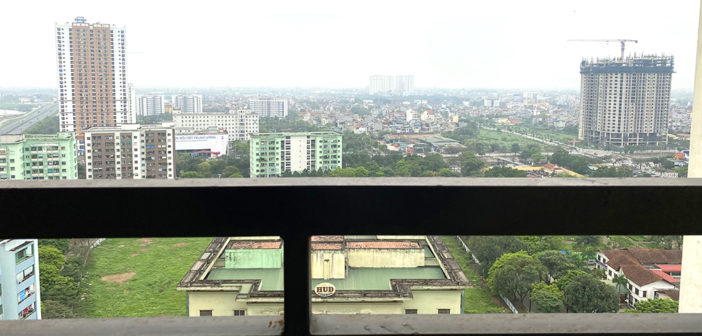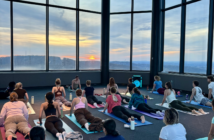Lina Oumera, ‘21, was at her brother’s home in Philadelphia when the Moroccan government announced that it would be suspending all international flights in and out of the country.
That night, Oumera breathed a sigh of relief as she boarded the last flight home hours before the border was sealed.
Likewise, Kaja Skerlj, ‘21, and Khue Nguyen, ‘22, returned to their homes in Slovenia and Vietnam, respectively, when the number of confirmed coronavirus cases soared across the U.S.
“I told my dad that classes would be conducted remotely for the remainder of the spring semester,” Skerlj said. “If I’d be somewhere inside for more than a few months, I’d like to be home.”
In quarantine, the three have gradually become accustomed to a “new normal,” as each country grapples with its own outbreak.
By April 1, Vietnam confirmed 218 cases of COVID-19. On March 31, racing to curtail the pandemic, Prime Minister Nguyen Xuan Phuc announced a nationwide stay-at-home order, Reuters reported.
Millions of Vietnamese citizens were asked to self-isolate and only leave home for necessities.
Gatherings of more than two people in public is prohibited, and everyone must adhere to a social distance of 2 meters. Starting March 16, all Vietnamese and foreign nationals are required to wear face masks in public places or else they will face a fine, according to Vietnam News.
As of March 17, Vietnam successfully produced test kits that help diagnose a COVID-19 infection in under an hour, according to VNExpress. The 200,000 rapid test kits imported from South Korea will be used for testing tens of thousands of people under home quarantine and in quarantine facilities for free of charge.
“Testing and medical treatment in Vietnam are more accessible than in the U.S.,” Nguyen said. “The population is smaller and hence, easier to control.”
Upon arriving home, Nguyen filled out a medical form and had her body temperature taken at the airport. As with other passengers entering from the U.S. and European countries, her passport was confiscated for 14 days, during which she was monitored at a quarantine facility.
Nguyen was tested for the virus three days after she entered. She said those with positive test results are transferred to the hospital, while the rest remain in quarantine at the facility for the next 11 days.
Free of charge, the facility provides three meals a day and takes body temperature twice daily, Nguyen said. The stairs are restricted so nobody can go up and down the facility, only around the hall.
On her journey home, Skerlj tried to cover the bottom half of her face with a sweater, sometimes keeping a 3-inch distance with the front of the queue. Like everyone else, she said she washed her hands repeatedly on the plane — so often that what’s left in the diluted soap dispenser yielded water-thin bubbles.
Slovenia has reported 802 confirmed coronavirus cases so far. Starting March 31, Slovenians are confined to their municipality of permanent or temporary residence for the majority of daily activities, according to the state administration’s central website.
“Everything happened so fast,” Skerlj said. “Italy is our neighbor, so what happened to Italy could have easily happened to us.”
Individuals, subject to their maintaining a safe distance from other people, are allowed access to work, grocery stores, petrol stations, banks, post offices and medical care among other imperative services, Skerlj said.
“Everyone is on the same page,” Skerlj said. “My family is religious, so they like to go to church. For the first time in years, decades even, they miss Sunday services.”
Oumera decided to self-quarantine at her grandparents’ previous home because she said she feared her family members might contract the virus had she carried it.
“I’m not too scared for myself because I know I won’t leave the house,” Oumera said. “But I’m scared for a number of my family members who still had to work or come in contact with other people.”
The Moroccan Ministry of Health has recorded 617 confirmed cases as of April 1.
The first case of COVID-19 in Morocco was detected on March 2.
On March 20, the government of Morocco announced a national lockdown that will remain in effect until April 20 — shutting down most establishments and canceling flights to its airports, according to the U.S. Embassy and Consulate in Morocco.
Precisely, only one member of each family is permitted to shop for necessities.
Workers must have permission to show to authorities, and failure to comply could result in a misdemeanor punishable by imprisonment of up to three months, the Associated Press reported.
“Morocco is doing a great job,” Oumera said. “I’m glad that I’m home.”






Comment policy
Comments posted to The Brown and White website are reviewed by a moderator before being approved. Incendiary speech or harassing language, including comments targeted at individuals, may be deemed unacceptable and not published. Spam and other soliciting will also be declined.
The Brown and White also reserves the right to not publish entirely anonymous comments.
1 Comment
We are so glad to hear our girl Kaia is home and safe. Kaia spent the holidays with us when she couldn’t go home. I work in transportation at LU and drove the track team. We tried to get in touch with her but her cell was disconnected. Thanks for the story!!
Tom and Pat Wiley
“COACH”